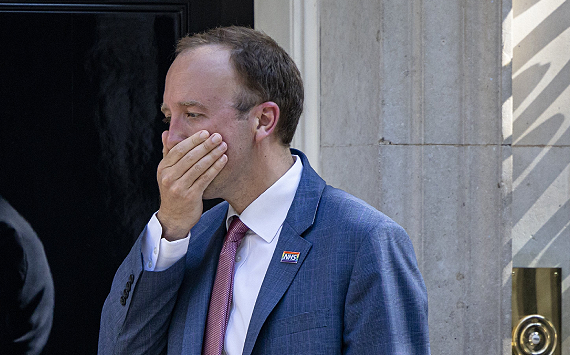
Can Matt Hancock survive? The Health Secretary has conceded that he broke lockdown regulations while having an affair with his aide, Gina Colangelo. But the Prime Minister’s spokesperson has said that Boris Johnson has accepted the apology and considers the matter “closed”.
I said this morning that there were several reasons why Hancock was likely to survive, which I wrote about in more detail in my morning email. But there are three important changes to his stature that have big implications for this government and for government policy in general.
The first is that Boris Johnson and Matt Hancock no longer "come as a pair". The biggest reason why Dominic Cummings's attacks on Hancock didn't land is that for Johnson, to fire Hancock would be to admit a degree of fault on his part, too. While I think firing someone for "having an affair in an unprofessional way" will be highly embarrassing for the Prime Minister, the extent of the damage is "have a bad PMQs". Up until now, firing Matt Hancock would have meant "reopening any number of questions about your handling of the pandemic".
I still think he is unlikely to do so at the next reshuffle, not least because I think it is unlikely there will be a next reshuffle (the Prime Minister did not enjoy the last one and it did not go well, politically speaking), but it’s worth noting that the politics of getting shot of Hancock are less fraught for Johnson this afternoon than they were yesterday.
The second change is that it surely means the final end of all coronavirus restrictions in England on 19 July come what may. The parliamentary party is already fractious enough as it is, but the political prospect of a Health Secretary who admits he broke the regulations extending them further is just, I think, untenable.
And the third change is what it does to the biggest and most important conflict in this government: the long-running one between Boris Johnson and his Chancellor, Rishi Sunak. The underlying problem is that Sunak is a fiscal hawk and the Prime Minister is not: this has been at the centre of almost every big row in the government. It took what one Treasury official described to me as “Herculean” efforts by the Chancellor to deliver his March budget, which, despite how it was presented in much of the media, was a pretty austere one. But the Treasury has always known that it was just the first part in a long series of battles: the next big one will be in the autumn, when the comprehensive spending review has to turn the Chancellor’s budget promises into tangible cuts in spending.
One of Sunak’s biggest assets is that Johnson has no ready alternatives. Chancellor of the Exchequer is one of the hardest roles in government to fill. The list of available candidates who could actually do the job is not long. In a recent repeat of the exercise I conducted during the 2019 Conservative leadership and 2020 Labour leadership elections, I asked a large number of officials, former Treasury ministers and so on who they thought could do the role.
It produced the following list: Greg Clark, Kwasi Kwarteng, Liz Truss, Steve Barclay, Greg Hands, Sajid Javid and Matt Hancock. Of that list, five – Truss, Kwarteng, Barclay, Hands and Javid – would bring the same problem for Johnson that he has with his current Chancellor, while Clark would also be a politically difficult fit for other reasons.
There is really only one candidate in the parliamentary party if Johnson finds himself chafing at the fiscal straitjacket Sunak has put him in: Matt Hancock. As of today, that isn’t really a tenable proposition. Even though the Health Secretary looks certain to survive this story, the political balance of forces at the top of the Conservative Party has been changed and changed significantly.















